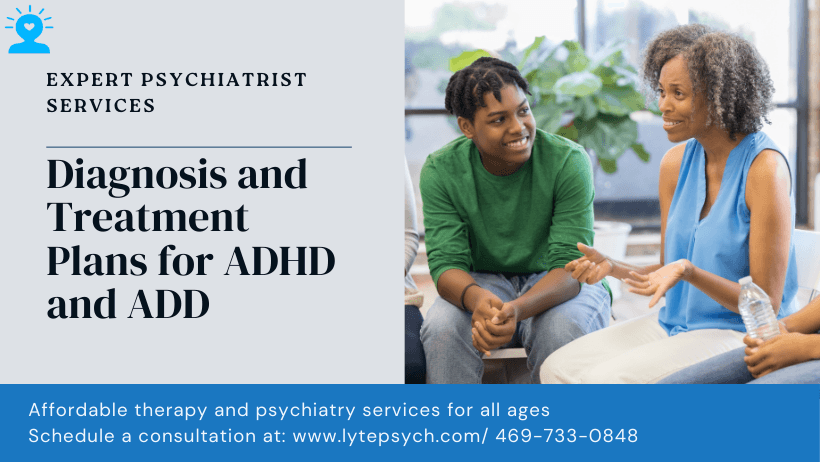Wed Jul 10 2024
ADHD vs. ADD: Diagnosis and Treatment Plan Available at Lyte Psychiatry (Affordable Therapist and Psychiatrist Near You), Best Adults & Adolescents Psychiatrist and Therapist Near You, Dallas, Fort Worth, TX

ADHD vs. ADD: Diagnosis and Treatment Plan Available at Lyte Psychiatry (Best Adults & Adolescents Psychiatrist and Therapist Near You)
Understanding ADHD and ADD
Attention Deficit Hyperactivity Disorder (ADHD) and Attention Deficit Disorder (ADD) are terms often used interchangeably, but they have distinct differences. ADHD is characterized by inattention, hyperactivity, and impulsivity, while ADD primarily involves inattention without the hyperactive component. Recognizing these differences is crucial for accurate diagnosis and effective treatment.
Symptoms of ADHD and ADD
ADHD Symptoms:
Inattention: Difficulty sustaining attention, careless mistakes, not listening, and losing items.
Hyperactivity: Fidgeting, inability to stay seated, excessive talking, and restlessness.
Impulsivity: Interrupting others, difficulty waiting for turns, and making hasty decisions.
ADD Symptoms:
Inattention: Similar to ADHD, including difficulties with focus, organization, and following through on tasks.
Lack of Hyperactivity: Individuals with ADD do not exhibit the hyperactive and impulsive behaviors seen in ADHD.
Diagnosis at Lyte Psychiatry
Accurate diagnosis of ADHD or ADD requires a comprehensive evaluation. At Lyte Psychiatry, our experienced professionals use a multi-faceted approach to ensure precise diagnosis:
Clinical Interviews: In-depth discussions with the patient and their family to understand symptoms, behavior patterns, and medical history.
Behavioral Assessments: Standardized questionnaires and rating scales to evaluate the severity and frequency of symptoms.
Observation: Direct observation of the patient in different settings, such as home and school, to gather insights into their behavior.
Medical Examination: A thorough medical check-up to rule out other conditions that might mimic ADHD or ADD symptoms.
Treatment Plans at Lyte Psychiatry
Our treatment plans are tailored to meet the unique needs of each patient. We offer a combination of therapies to provide comprehensive care:
Behavioral Therapy:
Focuses on modifying negative behaviors and developing coping strategies. Techniques include positive reinforcement, structure, and organizational skills training.
Medication Management:
When appropriate, medications such as stimulants (e.g., Adderall, Ritalin) or non-stimulants (e.g., Strattera) are prescribed to help manage symptoms. Our psychiatrists closely monitor the patient’s response to ensure optimal results.
Parent and Family Training:
Educating and involving family members to create a supportive environment for the patient. This includes strategies for managing behaviors and improving communication.
Educational Support:
Collaboration with schools to implement individualized education plans (IEPs) and accommodations to support the patient’s learning needs.
Conclusion
Understanding the differences between ADHD and ADD is essential for proper diagnosis and treatment. At Lyte Psychiatry, we are dedicated to providing personalized care that addresses the unique needs of each patient.
If you or a loved one is experiencing symptoms of ADHD or ADD, contact Lyte Psychiatry today to schedule a consultation. Our expert team is here to guide you through the diagnosis and treatment process, ensuring the best possible outcome for your mental health and well-being.
Frequently Asked Questions (FAQs)
Q: What is the main difference between ADHD and ADD?
A: The primary difference is that ADHD includes hyperactivity and impulsivity, whereas ADD primarily involves inattention without hyperactive behaviors.
Q: Can ADHD or ADD be outgrown?
A: While symptoms may change with age, ADHD and ADD are typically chronic conditions. Early diagnosis and treatment can help manage symptoms effectively.
Q: How long does it take to diagnose ADHD or ADD?
A: The diagnostic process can vary but generally involves several appointments for a thorough assessment, including interviews, questionnaires, and observations.
Q: Are medications for ADHD and ADD safe for children?
A: Medications are generally considered safe when prescribed and monitored by a qualified psychiatrist. Potential side effects are closely monitored to ensure the patient’s safety.
Q: What lifestyle changes can help manage ADHD or ADD symptoms?
A: Routine, structure, and a healthy lifestyle, including regular exercise, a balanced diet, and sufficient sleep, can significantly help manage symptoms. Behavioral therapy also plays a crucial role in developing effective coping strategies.